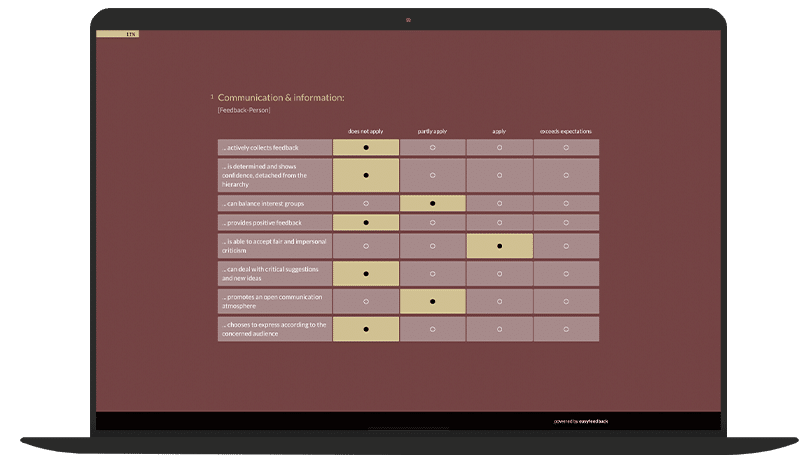What is leadership competence?
Leadership refers to a person’s ability to lead and motivate people while achieving both short-term and long-term goals.
It includes a variety of traits and skills that work together to create a positive and productive work environment.
Leadership skills are not innate, but can be developed and honed.
It is a matter of both self-awareness and the ability to communicate and interact effectively with others.
Important components of leadership competence
1st component: Communication skills
A good manager must be able to communicate clearly and precisely.

This applies both to the ability to convey information and to active listening.
Only those who understand the needs and perspectives of their team can act in a targeted and goal-oriented manner.
2nd component: Empathy and emotional understanding
Empathy is a fundamental leadership skill.
It enables managers to recognize and respond to the emotions and needs of their employees.
Emotional intelligence not only promotes trust, but also employee commitment and satisfaction.
3rd component: decisiveness
Managers often have to make difficult decisions.
Decisiveness means not only acting quickly, but also making well-founded decisions that take into account the well-being of the company and its employees.
A manager must be able to analyze information, weigh up risks and make clear decisions.
4th component: Vision and strategic thinking
Good leadership also means having a clear view of the future.

Managers should be able to develop a long-term vision for the company and align their teams with this goal.
This requires strategic thinking and the ability to recognize opportunities and challenges at an early stage.
5th component: Responsibility and acting as a role model
A manager must take responsibility – for their own decisions, but also for those of the team.
An important element of leadership competence is the role model function.
An authentic and integrative manager acts according to the values they expect from their team and demonstrates through their behavior how problems should be approached and solved.
6th component: Team orientation and collaboration
A manager is never solely responsible for success.
They must be able to motivate their team and promote cooperation.
This means recognizing the strengths and weaknesses of team members and creating an environment that supports collaboration and innovation.
How can you develop leadership skills?
1st method: Self-reflection and feedback
One of the most effective methods for developing leadership skills is regular self-reflection.
Managers should ask themselves in which areas they can improve and be open to feedback from their employees and colleagues.
This can be done through surveys such as 360-degree feedback, formal feedback meetings, but also through informal feedback.

2nd method: Mentoring and coaching
Exchanging ideas with experienced managers can provide valuable insights and suggestions.
Mentoring or coaching programs offer the opportunity to learn from the experiences of others and to develop further in a safe environment.
A coach can help to promote specific leadership skills and identify individual strengths and weaknesses.
3rd method: training and further education
Leadership skills can be developed through targeted further education and training measures.
Seminars, workshops and online courses offer a good opportunity to acquire new knowledge and learn practical skills.

Programs that deal with specific leadership topics such as conflict management, communication or strategic thinking are particularly valuable.
4th method: Gain practical experience
The best way to develop leadership skills is through practical experience.
This means taking on leadership and actively meeting challenges.
Even small leadership tasks, such as managing projects or teams, can provide valuable experience and insights.
Practice makes it possible to put theory into practice and to learn continuously.
5th method: Training empathy and emotional intelligence
Dealing with other people is one of the most important skills of a manager.
Empathy and emotional intelligence can be specifically trained, for example through mindfulness techniques or by studying literature on these topics.

A high degree of emotional intelligence helps to respond better to the needs of the team and to resolve conflicts constructively.
6th method: Networking and exchange
Exchanging ideas with other managers, both inside and outside the company, can offer new perspectives and inspiration.
Networking events or leadership communities offer the opportunity to learn from each other and adopt new ideas and strategies from other leaders.
Conclusion
Leadership competence is a key qualification that is of great importance both for the success of companies and for the personal growth of managers.
It is the result of continuous development of skills such as communication, empathy, decision-making and strategic thinking.
Good managers are not only able to lead their teams, but also to constantly reflect on and develop themselves.
Leadership skills are therefore not static, but a dynamic process that is geared towards the challenges and changes in the world of work.
Those who acquire and cultivate this competence not only become more successful as managers, but also contribute to the long-term success of the organization.




